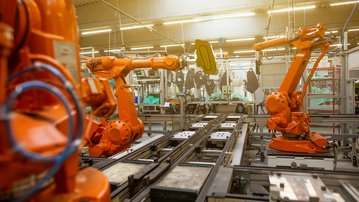
AI is transforming industries across the board, chaning the way we organise work and innovate. This article will elaborate on how AI disrupts industries, as well as the benefits and challenges of AI in digital transformation.
AI is transforming industries across the board, chaning the way we organise work and innovate. This article will elaborate on how AI disrupts industries, as well as the benefits and challenges of AI in digital transformation.
AI is a reality, and has been now for some time. Companies are already using it to transform decision-making by analysing big data to uncover valuable insights, replacing the need for intuition. It's used in finance to identify market trends, in healthcare to detect medical issues, and in various industries to automate tasks and enhance customer experiences. Additionally, AI fosters innovation and efficiency in sectors like agriculture and energy.
AI in Customer Service
AI-powered chatbots can streamline customer service inquiries by providing responses rapidly and relieving human agents to address more complicated questions. It is the technology used in many industries, providing better operational efficiency and customer satisfaction.
Before AI was here, having a chatbot was very tedious both for the customer and the company. To create a chatbot that could answer questions about your company you need to make complex trees of logic, and it takes time. For the customer it was never a good experience because it was so obvious that it is a chatbot, and on top of that, receiving a tailor answer was impossible. But with AI is so easy, and it can learn everything about your business just through your website.
For example, a bank uses AI to deal with simple questions. At the same time, human customer service representatives can provide more sophisticated financial advice and support. Another example would be how H&M uses AI chatbots to handle basic customer inquiries, such as order status and return policies, allowing human representatives to focus on higher level tasks.
AI in Manufacturing
AI-driven systems are employed for predictive maintenance and quality control. AI can predict potential failures in machinery by analysing data and, therefore, help us prevent outages, downtime, and maintenance costs. The quality of goods is controlled by AI due to the ability to detect defects during production. There are also other reasons for significantly lower consistency and reliability—the incredible potential of smart contracts. Distributed ledger technology (DLT) is also making fast inroads in the automotive industry. Car manufacturers use artificial intelligence (AI) to monitor every part of an assembly line, ensuring that each vehicle meets strict parameters for safety and performance.
AI in Healthcare
It has also revolutionised healthcare by enabling more accurate diagnostics and improving treatment planning. Using AI, healthcare data is analysed via these algorithms, and patients' personalised treatment recommendations are given, resulting in higher patient outcomes. AI is even helping to develop new treatments faster by predicting how researchers can expect various compounds to behave in the effort of drug discovery. Think about the ability of AI to predict patient readmissions and aid healthcare providers in taking immediate actions before complications arise by decreasing hospital costs.

While adopting an artificial intelligence solution has its benefits, it also presents challenges, such as concerns related to data privacy and a massive requirement for computational power (not everyone is Google) or integrating /kickstarting use cases at enterprise-level integration. To overcome these hurdles, stakeholders should invest in reliable data storage containers like cold wallets to house their digital assets safely and use cloud computing for scalable processing reminiscence so that technical hitches are clear from AI adoption via collaboration with specialists.
An interesting company in this AI value chain is Cool Gradient. They are helping to make data warehouses more efficient due to the substantial power requirements of AI software. Cool Gradient uses AI technology, like reinforced learning, to create efficient performance reports, and their clients can enjoy enhanced reliability without the need for infrastructure changes. Yet another example of how AI can transform processes, to streamline efficiency, but also meet sustainability targets.
There are more companies in this space, like Digital Reality for example, which have their own AI platform - Apollo AI, which has already identified 18 gigawatt-hours of savings which is enough energy to power about 1,600 homes in the U.S. for a year.
We often discuss the AI era and how we will arrive there soon, but in order for it to arrive, we first need to have the necessary energy and power to support it, and at present, we are far from achieving that.

New technologies like quantum computing will provide an unimaginable advancement to Artificial intelligence that can improve and transform how industries find innovative data transformation methods. Artificial intelligence is set to blend even deeper into enterprises, fueling more innovation and efficiency. Up-and-coming trends, like AI-led sustainability campaigns, are also afloat, pointing to utilising AI to resolve global issues. In a perfect world, AI would not only fix your company's inefficiencies but also transform environmental issues that we are now facing—such as resource management and climate change—into evidence.
At SRH Haarlem University of Applied Sciences, our Digital Transformation Management programme is not just about theory. We equip students with the skills to employ AI meaningfully through a curriculum focused on data analytics, automation, and innovation. More importantly, we infuse our curriculum with practical projects and real-world applications, providing students with hands-on experience in AI technologies. This approach instils confidence in our students, preparing them for leadership in the digital era.
Are you ready to embark on an exciting journey in the digital transformation field? Apply now to our Digital Transformation Management programme. Discover how you can become a leader in this rapidly evolving space. We look forward to welcoming you to our campus and helping you realise your potential in the digital transformation field.
Text us for faster responses, and we will do our best to answer quickly! Get personal guidance.